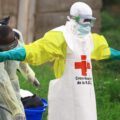Infectious diseases are defined as disorders caused by pathogenic microorganisms, such as bacteria, viruses, parasites, or fungi that can be spread directly or indirectly (vector-borne) from one individual to another. An infectious disease can differ from simple infection, which is the invasion of and replication in the body by any of various agents including bacteria, viruses, fungi, protozoans, and worms as well as the reaction of tissues to their presence or to the toxins that they produce. When health is not altered, the process is called subclinical infection. Thus, a person may be infected but not have an infectious disease. This principle is illustrated by the use of vaccines for the prevention of infectious diseases. For example, a virus such as that which causes measles may be attenuated (weakened) and used as an immunizing agent. The immunization is designed to produce a measles infection in the recipient but generally causes no discernible alteration in the state of health. It produces immunity to measles without producing a clinical illness (an infectious disease).
The most important barriers to the invasion of the human host by infectious agents are the skin and mucous membranes (the tissues that line the nose, mouth, and upper respiratory tract). When these tissues have been broken or affected by the earlier disease, invasion by infectious agents may occur. These infectious agents may produce a local infectious disease, such as boils, or may invade the bloodstream and be carried throughout the body, producing generalized bloodstream infection (septicemia) or localized infection at a distant site, such as meningitis (an infection of the coverings of the brain and spinal cord). Infectious agents swallowed in food and drink can attack the wall of the intestinal tract and cause local or general disease.
The conjunctiva, which covers the front of the eye, may be penetrated by viruses that cause a local inflammation of the eye or that pass into the bloodstream and cause severe general diseases, such as smallpox. Infectious agents can enter the body through the genital tract, causing the acute inflammatory reaction of gonorrhea in the genital and pelvic organs or spreading out to attack almost any organ of the body with the more chronic and destructive lesions of syphilis. Even before birth, viruses and other infectious agents can pass through the placenta and attack developing cells, so that an infant may be diseased or deformed at birth.
From conception to death, humans are targets for attack by multitudes of other living organisms, all of them competing for a place in the common environment. The air people breathe, the soil they walk on, the waters and vegetation around them, and the buildings they inhabit and work in, all can be populated with forms of life that are potentially dangerous. Domestic animals may harbor organisms that are a threat, and wildlife teems with agents of infection that can afflict humans with serious diseases. However, the human body is not without defenses against these threats, for it is equipped with a comprehensive immune system that reacts quickly and specifically against disease organisms when they attack. Survival throughout the ages has depended largely on these reactions, which today are supplemented and strengthened through the use of medical drugs.
What is an infectious disease specialist?
While many infections can be treated by your primary care physician there are times when you might need to see an infectious disease specialist. The prospect brings up some important questions. What does this type of specialist do? When might you need to see one? How are they trained?
How is an infectious disease specialist trained?
The IDSA explains that infectious disease specialists have 4- 6 years of medical school depending on the country three years of training in internal medicine and two to three years of specialized training in infectious diseases. They also emphasize that board certification requires passing a “difficult certification examination” in both internal medicine and infectious diseases.
What does an infectious disease specialist do?
The IDSA says that infectious disease specialists review medical history tests lab reports and other data. They may perform a physical examination and order additional laboratory tests like blood work cultures from wounds or samples of body fluids.
They may also prescribe treatments such as medication usually antibiotics — to help combat your infection. Antibiotics may be given orally like a pill or liquid medicine or via IV directly into the veins. Many infectious disease specialists can administer IV antibiotics in the office. Vaccinations may be part of your care as well particularly if you’re seeing an infectious disease specialist in advance of travel to a foreign country. Infectious disease specialists work in collaboration with your primary care physician to develop a treatment plan that will best help you.
What complications are associated with infectious diseases?
Many infectious diseases cause complications. These can range from mild to severe. For some conditions, complications may include wheezing, skin rash, or extreme fatigue. Mild complications usually disappear as the infection resolves. Certain infectious diseases may cause cancer. These include hepatitis B and C (liver cancer), and human papillomavirus (HPV) (cervical cancer).
What are the symptoms of infectious diseases?
Symptoms of infectious disease are particular to the type of disease. For example, symptoms of influenza include:
- Fever
- Chills
- Congestion
- Fatigue
- Muscle aches and headache
Other infectious diseases, such as Shigella, cause more serious symptoms, including:
- Bloody diarrhea
- Vomiting
- Fever
- Dehydration (lack of fluid)
- Shock
You may experience one or several symptoms of an infectious disease. It’s important to see a doctor if you have any chronic (ongoing) symptoms or symptoms that get worse over time.
WHO best practices for the naming of new human infectious diseases
WHO, in consultation and collaboration with the World Organisation for Animal Health (OIE) and the Food and Agriculture Organization of the United Nations (FAO), has identified best practices for the naming of new human diseases, with the aim to minimize unnecessary negative impact of disease names on trade, travel, tourism or animal welfare, and avoid causing offense to any cultural, social, national, regional, professional or ethnic groups. SEE: Top Community Health Specializations You Should Know






